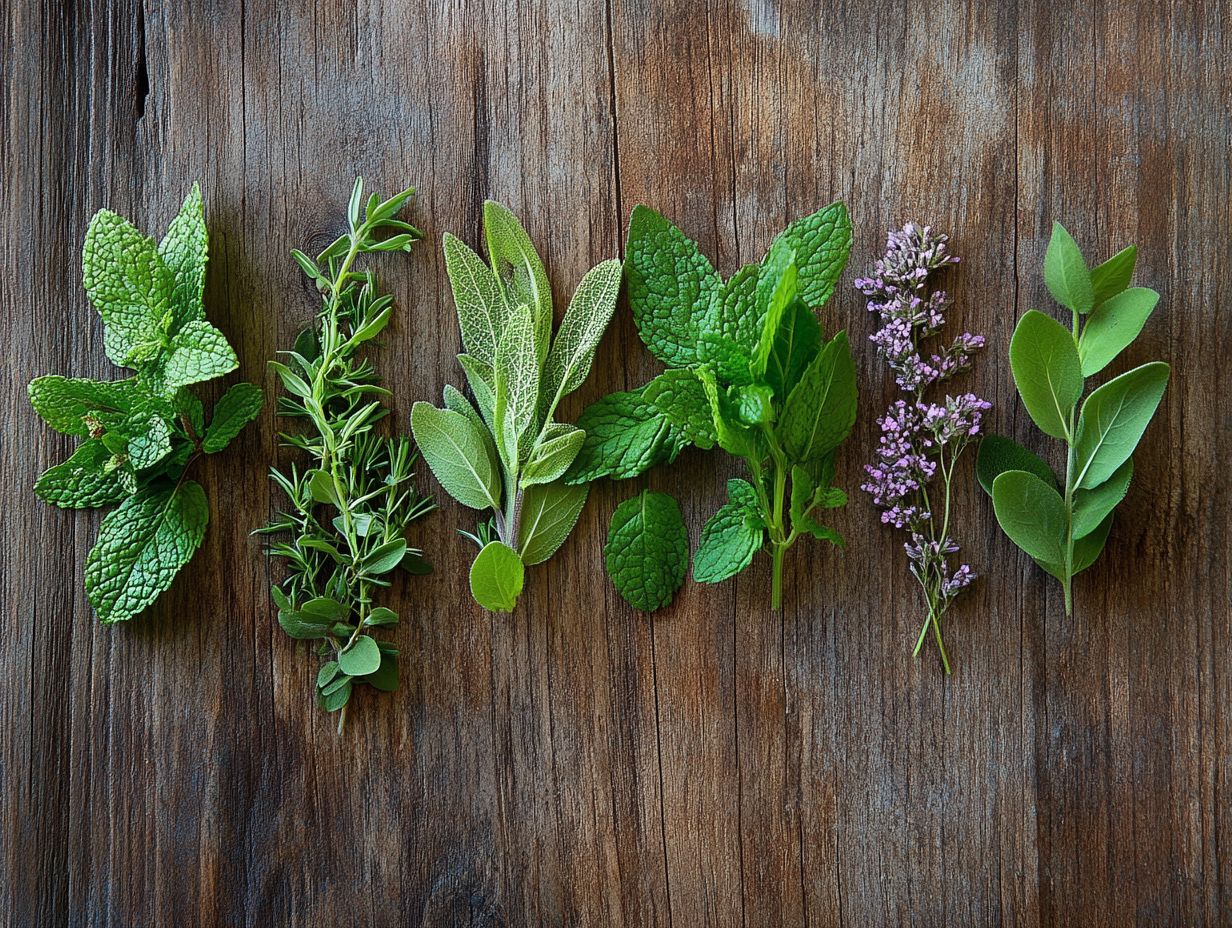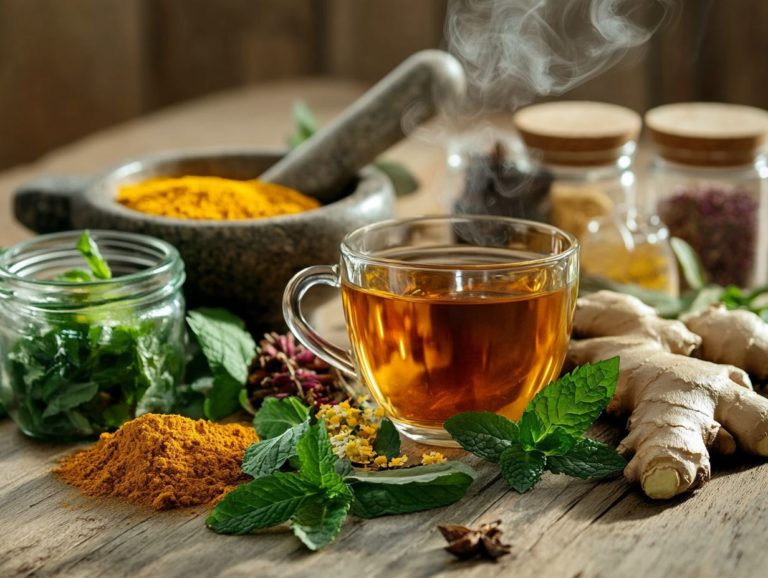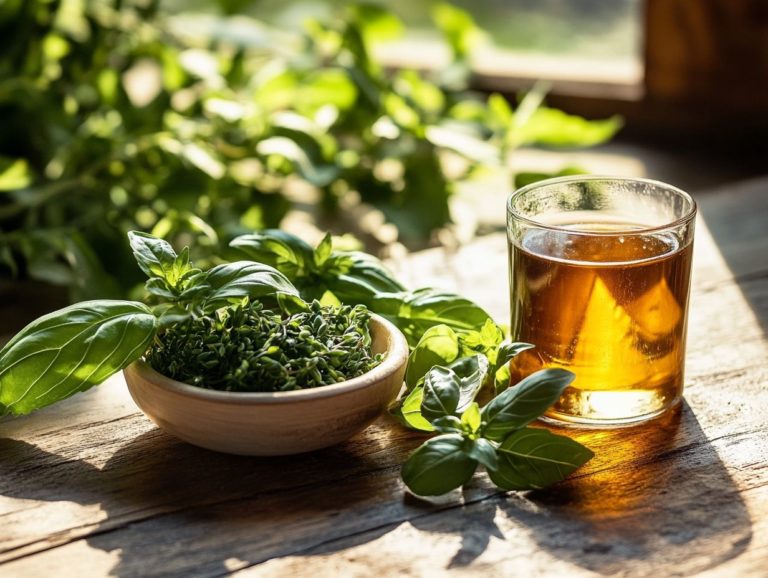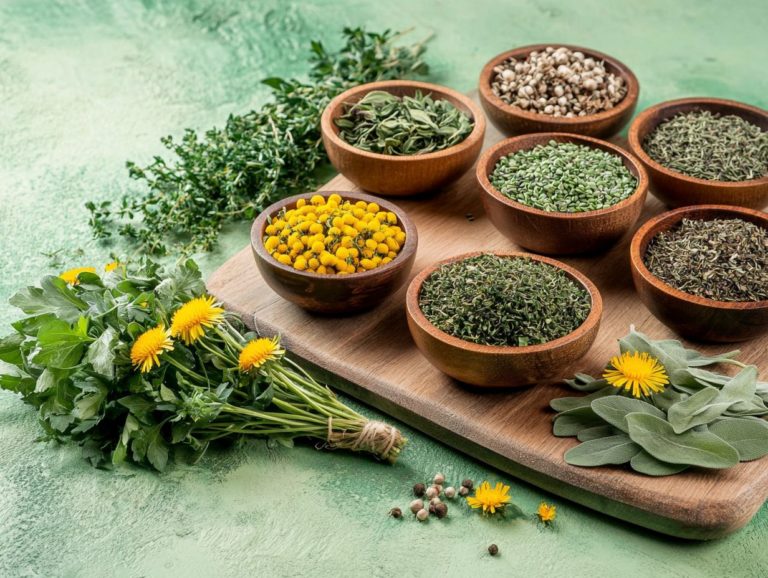Top 5 Herbs for Respiratory Aid
Struggling with respiratory issues and searching for natural relief? You re in good company. Many individuals are turning to herbal remedies to enhance their respiratory health.
Join us to discover the top five herbs renowned for easing respiratory discomfort: eucalyptus, peppermint, oregano, ginger, and thyme. Discover how these herbs work wonders for your breathing, their various forms, potential side effects, and effective combinations for optimal outcomes.
Embark on this journey to discover a natural approach to better breathing!
Contents
Key Takeaways:

- Eucalyptus helps with respiratory issues by acting as a natural decongestant and anti-inflammatory.
- Peppermint aids in respiratory health by loosening mucus and reducing inflammation.
- Oregano has antibiotic and anti-inflammatory properties, making it effective for addressing respiratory issues like bronchitis and asthma.
1. Eucalyptus
Eucalyptus is a remarkable herb known for its benefits in supporting respiratory health. It is a key ingredient in many herbal remedies that enhance your overall well-being.
The leaves of this versatile plant contain cineole, a natural compound found in eucalyptus that helps clear airways and acts as a natural expectorant, helping you cough up mucus.
As you explore eucalyptus, you’ll find it in several forms: essential oils, teas, and poultices.
Inhaling eucalyptus oil vapors effectively alleviates coughs, while sipping eucalyptus-infused tea can provide soothing relief for sore throats. Scientific studies show that these properties can significantly reduce bronchial inflammation and enhance lung function, making eucalyptus invaluable for respiratory support.
2. Peppermint
Peppermint is not just a flavorful herb; it offers powerful relief for your respiratory health, making it a popular choice in herbal remedies.
The menthol content in peppermint opens up your airways, helping to relieve congestion and promote easier breathing. Many individuals enjoy peppermint teas or essential oils for these benefits.
Inhaling the aromatic vapors from peppermint oil can soothe your throat and reduce irritation. Plus, adding peppermint to hot teas not only creates a refreshing drink but also calms coughs and alleviates sinus pressure.
By incorporating this versatile herb in various forms, you can create an effective natural support system for your respiratory health.
3. Oregano
Oregano is celebrated for its remarkable health benefits, particularly in respiratory health, making it an essential herb in your collection of remedies.
Packed with potent compounds like carvacrol and thymol, oregano reduces inflammation and serves as a natural expectorant, aiding in mucus clearance from your respiratory passages.
You can brew a soothing oregano tea to relieve congestion or diffuse essential oil extracts to promote easier breathing.
In Mediterranean traditions, oregano has long been used in folk medicine to address respiratory ailments, reflecting its significant role in global health practices and making it a valuable addition to your health routine.
Try these herbs today and share your experiences!
4. Unlock the Power of Ginger

Ginger is a remarkable root that boasts many health benefits, particularly in promoting respiratory health. It is an essential ingredient in numerous herbal remedies you might encounter on your wellness journey.
Renowned for its powerful anti-inflammatory properties, ginger can help alleviate symptoms associated with asthma and bronchitis. This ultimately improves your lung function. If you’re looking to incorporate ginger into your daily routine, consider enjoying a soothing cup of ginger tea or opting for high-quality supplements that harness its therapeutic effects.
Historically, ginger has held a vital place in traditional medicine practices. It s admired not only for its delightful flavor but also for the healing properties cherished through generations. By incorporating ginger into your wellness rituals, you can embrace its time-honored benefits while enhancing your respiratory health.
5. Why Thyme is Essential for Your Health
Thyme is not just a versatile herb for your culinary creations; it s also a powerful ally for your respiratory health. It serves as a cornerstone in herbal and natural remedies that enhance your wellness journey.
This remarkable herb boasts potent antimicrobial properties that can help fend off respiratory infections and soothe pesky coughs. Its essential oil, abundant in thymol, is used in teas and tinctures specifically crafted to support lung health.
For centuries, various cultures have recognized thyme s therapeutic potential. It has been employed in comforting steam inhalations and traditional potions designed to alleviate congestion.
Incorporating thyme into your everyday cooking is easy whether in roasted dishes or hearty soups, it enhances flavor and adds a layer of health benefits. This demonstrates thyme s enduring significance in both culinary and herbal traditions, proving that it truly deserves a place in your kitchen and wellness arsenal.
What Are Respiratory Issues and How Do They Affect the Body?
Respiratory issues encompass various conditions that impact your respiratory system, including asthma, allergies, and infections. These challenges can significantly affect your overall health, especially considering recent events like COVID-19. Discover how herbal remedies can be your best solution for respiratory relief!
You may experience a range of symptoms, such as a chronic cough, wheezing, shortness of breath, and even fatigue. All of these can disrupt your daily activities and diminish your quality of life.
Ongoing respiratory problems may lead to serious complications, such as reduced lung function and increased vulnerability to infections.
As you navigate these challenges, herbal remedies like eucalyptus, ginger, and peppermint can offer supportive treatment options. For instance, exploring the top 5 DIY herbal remedies for stress relief may help alleviate your symptoms, enhance your lung health, and provide a holistic approach to managing respiratory issues, all while complementing conventional medical advice.
How Can Herbs Help with Respiratory Issues?
Herbs play a pivotal role in enhancing your respiratory health, offering natural remedies that can alleviate symptoms and provide therapeutic relief through their expectorant properties and soothing effects.
Incorporating these botanicals into your daily routine can significantly improve your quality of life, especially if you re facing chronic respiratory issues. Take thyme, for instance; it s well-known for its antimicrobial properties, which can help combat the infections that often accompany coughs and congestion.
Similarly, slippery elm is celebrated for its soothing qualities. It helps coat your throat and reduce irritation particularly comforting during those relentless coughing fits.
Modern research backs up the traditional use of eucalyptus, demonstrating its effectiveness in opening airways and alleviating mucus buildup. Together, these herbs not only offer historical benefits but also contemporary validation, making them invaluable allies in your respiratory care arsenal.
Act now to improve your respiratory health with these powerful herbs that support healthy digestion! Consult a healthcare professional for personalized advice.
What Are the Different Forms of Herbal Remedies for Respiratory Issues?

Herbal remedies for respiratory issues offer a delightful variety of options. These include teas, tinctures, and cough syrups. Each has unique benefits that align with your natural wellness journey.
Herbal teas are soothing and hydrating. Just steep dried herbs like marshmallow root or peppermint in hot water for a comforting cup.
Tinctures are concentrated herbal extracts made by soaking plants in alcohol or vinegar. They are perfect for those who want quick absorption and potency.
Cough syrups combine syrups with herbal extracts like honey and thyme. This creates a sweet, palatable option for easing coughs and soothing the throat. Depending on your respiratory conditions like asthma or allergies, one form may suit you better than another.
The key is to explore and find what resonates with you.
How Can These Herbs Be Used for Respiratory Aid?
Using herbs for respiratory aid can transform your experience. You can brew fragrant herbal teas, craft delicious syrups, or elevate your meals with these natural wonders. Embrace these herbal remedies to enhance your respiratory health holistically.
To maximize the benefits, it’s important to know the ingredients, dosages, and preparation techniques. For instance, create a soothing cup of thyme tea by steeping a teaspoon of dried leaves in boiling water for about 10 minutes. If you prefer something sweeter, consider a simple syrup with honey, ginger, and thyme. This delightful mix adds flavor and packs a medicinal punch, easily fitting into your routine.
Consistency is key. These herbs work best when integrated into your daily life, allowing their long-term benefits to unfold over time. Don t forget about storage; keep your dried herbs in a cool, dark place to preserve their potency.
Are There Any Side Effects of Using These Herbs for Respiratory Aid?
While many herbs offer remarkable respiratory health benefits, stay alert to possible side effects and interactions. This ensures safe and effective use in your natural remedies.
For example, eucalyptus and peppermint may trigger allergic reactions in sensitive individuals or cause some digestive discomfort. Likewise, licorice root can affect blood pressure, and too much may create imbalances. Everyone reacts differently to herbal treatments.
Given these nuances, consulting with healthcare professionals before trying new herbs is advisable. This personalized guidance will help you navigate your herbal journey with confidence.
Can These Herbs Be Used in Combination for Better Results?
Combining various herbs enhances their individual benefits. This creates a combined effect that supports respiratory health.
For example, when you blend thyme with eucalyptus, you tap into thyme s antibacterial properties, meaning it can help fight bacteria. You also leverage eucalyptus s ability to clear airways, which helps you breathe better. Together, they form a powerful remedy for the common cold and bronchitis.
Pairing peppermint with mullein offers a soothing effect while promoting lung function. This combination is especially beneficial during flu season.
To prepare these effective blends, create an infusion by steeping the dried herbs in boiling water for about 10-15 minutes. This process allows the rich flavors and beneficial compounds to meld seamlessly, resulting in a comforting tea that you can truly enjoy.
Frequently Asked Questions

What are the top 5 herbs for respiratory aid?
- Eucalyptus
- Ginger
- Peppermint
- Thyme
- Licorice root
How does eucalyptus help with respiratory issues?
Eucalyptus has anti-inflammatory and decongestant properties, meaning it can reduce swelling and help clear mucus. This makes it effective in relieving respiratory symptoms such as cough, congestion, and bronchitis.
Can ginger be used for respiratory aid?
Yes, ginger has natural expectorant properties. This means it can help loosen and expel mucus from the respiratory tract, making it beneficial for those with respiratory issues.
Why is peppermint beneficial for respiratory health?
Peppermint has a high menthol content, which can relax the muscles in the respiratory tract, making it easier to breathe. It also has antibacterial and antiviral properties, which can help fight off infections.
How is thyme used for respiratory aid?
Thyme contains compounds that can reduce inflammation in the respiratory tract. This makes it useful for easing coughs and congestion. It also has antimicrobial properties, which can help fight respiratory infections.
Can licorice root be used for respiratory health?
Yes, licorice root has been used in traditional medicine for respiratory issues due to its anti-inflammatory and soothing properties. It can help reduce inflammation and irritation in the respiratory tract, making it useful for conditions like asthma and bronchitis.






